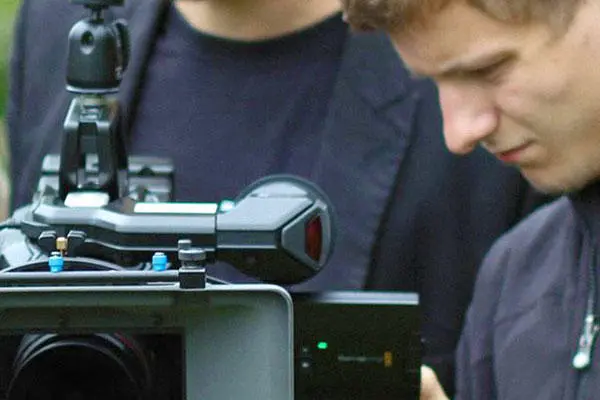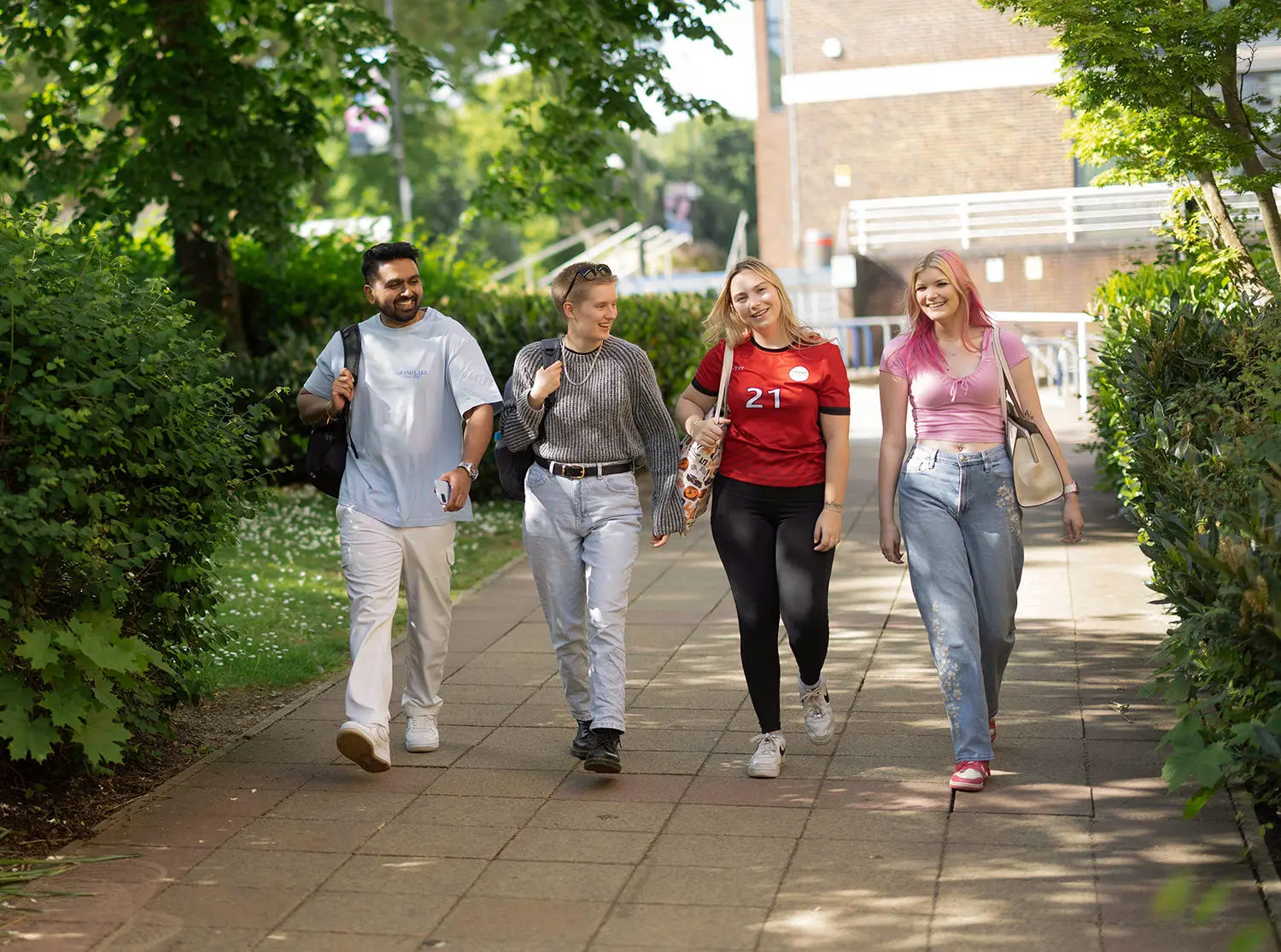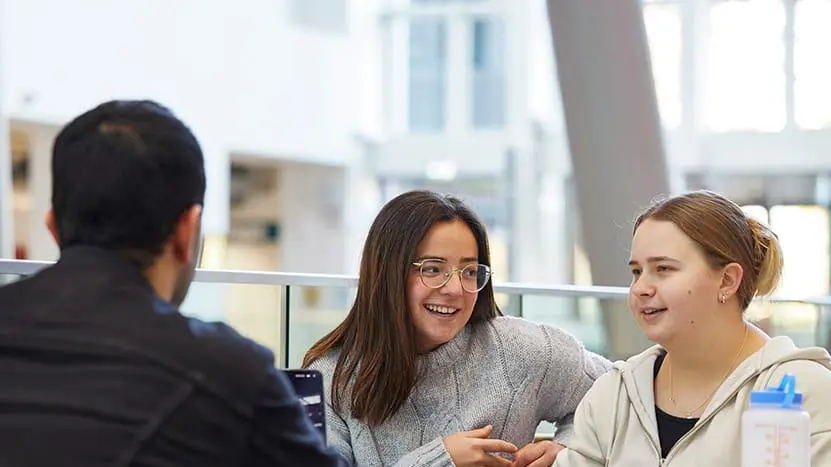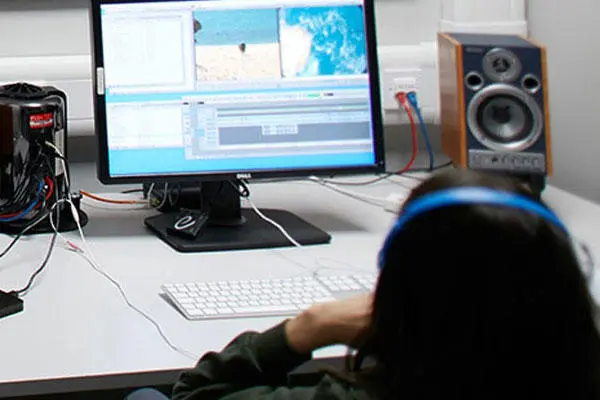
MA Film Production
Got a passion for filmmaking? Want to improve your professional showreel and boost your employability? Solent’s MA Film Production programme is ideally suited to students who...
Find out more
Step into the future of screen industries with a degree that combines creativity, technology, and engineering skills and uses state-of-the-art facilities including our virtual production studio.
Contact international admissions
Email: Call:Step into the future of screen industries with a degree that combines creativity, technology, and engineering skills. This Media Technology and Virtual Production course is designed for those who want to work behind the camera and at the heart of the systems that power modern film, television, and broadcast.
You’ll gain hands-on experience with the latest production tools, from professional broadcast equipment and studio systems, to cutting-edge virtual production workflows using Unreal Engine, LED volumes, and camera tracking within our flagship 10x3m Virtual Production stage. Alongside film, television, and live broadcast systems, you’ll explore audio engineering, lighting, camera operations, and the technical backbone that drives the creative sector.
The degree develops both creative and technical skills, preparing you for the fast-changing media landscape. You’ll learn how to work within complex productions, operate advanced media technologies, and collaborate effectively in team-based environments. The course emphasises problem-solving, innovation, and industry readiness, ensuring you graduate with practical experience that employers value.
Graduates will be prepared for careers across film, TV, broadcast, and immersive media. Typical roles include broadcast engineer, camera operator, virtual production technician, vision mixer, sound engineer, and media systems specialist. The course opens pathways into emerging industries such as XR, AR, and virtual production, where demand for skilled professionals is rapidly growing.
With strong industry links and access to professional-grade facilities, this course is your gateway into the technical side of TV, film, and broadcast. Whether you want to work on blockbuster productions, live sports coverage, or cutting-edge virtual studios, you’ll graduate ready to shape the next generation of screen content.
Part of:

Institutional member

Blackmagic Design

This course is ideally suited to students that would like to get into a rewarding and technically challenging field, want to learn strong engineering skills, and want to use them in the most interesting workplaces the world has to offer. Applicants don’t need specific engineering entry requirements, but should be motivated by solving problems, working hard to overcome challenges, and willing to use numeracy skills occasionally to do this.
Graduates will be prepared for careers across film, TV, broadcast, and immersive media. Typical roles include broadcast engineer, camera operator, virtual production technician, vision mixer, sound engineer, and media systems specialist. The course opens pathways into emerging industries such as XR, AR, and virtual production, where demand for skilled professionals is rapidly growing.
The University cannot guarantee any particular members of staff will teach specific aspects of the course in the future, but will endeavour to ensure the teaching team maintains their balance of experience and qualifications.
Not only does Solent have a fantastic range of facilities that enable world-class teaching in Media Technology and Virtual Production, but we’re extremely proud of the level of access you’ll get to the spaces and equipment.
Solent has one of the largest HD television provisions in the South of the UK - including a world-class virtual production studio with tracked cameras, full 3D virtual environments and LED display technology - as well as traditional and virtual green screen studios. Our professional grade audio production facilities include a 96-seat Dolby Atmos equipped 2K digital cinema, which is specifically designed as a mixing space. There is also many music studios and production facilities, including a 12-speaker Dolby Atmos for Music studio, five fully equipped studios with live rooms, and four mix suites where you can dedicate time to perfect audio work. Our custom-built HD broadcast truck allows your studies to reach out into the world and get some real experience on gigs and live events. Equipped with three broadcast standard cameras, a digital mixing desk, and three camera CCUs, we are fully prepared for any event.
Broaden your horizons by adding an international dimension to your CV – essential to achieving success in today’s fast-changing, global environment.
Studying, working or volunteering in another country could be the experience of a lifetime. Enhance your degree by developing important global skills such as knowledge of other countries, language skills, intercultural awareness, adaptability and confidence.
For more information, please email international.mobility@solent.ac.uk.

This module combines the audio and video technologies for studios, live events, and post-production. It covers studio setup, camera and lighting systems, event workflows, sound reinforcement, and core skills like mixing, editing, and colour correction.
This module will help you to understand how to quantify and model physical properties and phenomena as well as how to critically analyse observations. You will explore mathematical techniques such as using equations and graphs, and be introduced to functions such as logarithms and sine.
This module does not seek to make a master programmer of everyone, but rather equip you with the skills and knowledge to recognise common issues, talk fluently in the language of computers, and identify computers and computational skills as tools to make your professional and academic life easier and more efficient.
This module will focus on the pipelines for produced content, 3D development and scene building, colour and colour spaces, and how codecs in video work, and how they affect distribution. Visual enhancement refers to the use of advanced visual technologies and design strategies to elevate the aesthetic and functional aspects of live events, performances, and sports experiences.
This module is structured around experiential, practical learning in a simulated live broadcast environment. Students will take on a variety of roles found in professional outside broadcast (OB) setups, working both individually and as part of production teams. The focus is on learning by doing, allowing students to apply theoretical knowledge directly in realistic scenarios.
This module explores the dynamic and fast-evolving landscape of emerging technologies within the media technology, broadcast, and virtual production sectors. Responsive to the technology landscape as it moves, it encourages students to critically examine how new technologies emerge, gain traction, and reshape workflows, storytelling methods, and audience engagement.
This module is an exploration of the many facets of project work, from research skills and application of the scientific method, to working effectively in a team, and ensuring you produce excellent and well-presented results. The module is designed for you to have time and control over your learning.
This module gives you the opportunity to collaboratively explore the exciting area of Virtual Production from the perspective of your chosen specialist area. In this way you can apply learning from your own practice to this highly interactive and interdisciplinary format.
Extended Reality (XR) technology is transforming the way we create television media - and this module puts you right at the heart of that revolution. You’ll explore how cutting-edge technologies like real-time 3D rendering, LED volumes, motion tracking, and augmented reality are being used to blur the line between the physical and the digital.
This module develops advanced technical and organisational skills required for delivering professional-standard media and live event productions. Students deepen their understanding of production planning, systems integration, and multi-disciplinary coordination across lighting, sound, video, networks, and control systems. Emphasis is placed on applying engineering principles to real-world production workflows, solving the problems that arise to get the production complete.
The project module is aimed at allowing you to show off both your technical and your project management skills, and is typically one of the main things that employers are interested in when interviewing for graduate roles. It is important to identify the things that really interest you – the project is a great way to shape your degree to suit your interests and career aspirations.
Please note: Not all optional modules are guaranteed to run each year.
In this module, you'll explore different capture technologies in a simulated studio environment, transforming the physical world into digital assets. Typical technologies you'll use will be mocap, photogrammetry, LiDAR scanning, HDRI capture and on-set data. You’ll experiment, research and test one method in depth to build specialised, industry-ready skills.
With the complexities of modern digital production, it is often not efficient to produce individual assets, but rather produce procedural definitions which can be used to generate multiple assets with differing properties. This more technical approach to asset creation is highly sought after and is becoming ubiquitous in the games, CGI and VFX industries. This module explores node graphs and visual scripting methods to create procedural asset definitions of increasing complexity using Houdini.
Contact international admissions
Email: Call:As part of this course, you will study one module at a time, giving you the chance to build a deeper understanding and see the results of your hard work more quickly. With regular assessments and feedback, rather than exams all at once, you’ll also benefit from improved focus, and a more manageable workload.
Learn more about block teaching
The student achievement team are on hand to help you succeed during your studies at Solent. They aim to contact you at key times during your time here with personalised information, advice and guidance, by email or phone.
The disability advice team provides information, advice and guidance for disabled students.
All students can access Succeed@Solent, Solent's online guide to getting better grades. It offers extensive, practical information and advice on topics such as academic writing, research and presentations.
The UK Media Technology industry is vibrant, challenging, and competitive with the best in the world. Getting into the world of live events and broadcast gives you access to a high pressure, hugely rewarding career making TV, film, and live events work. It can take you around the world, solving some of the most interesting technical challenges out there to bring events and culture into people’s houses.

The Solent Careers team is committed to getting students into great careers.
While you are studying, the team can help you with finding work experience or placements, link you with a mentor, check your CV, or offer one-to-one guidance.
We also have graduate job opportunities just for Solent graduates.

6th
UK uni for sustained employment
Longitudinal Educational Outcomes, 2022
Every student at Solent University will also have the option to study an additional Certificate in Practical Artificial Intelligence qualification alongside their course. Free of charge, the course ensures you'll be prepared for a fantastic and varied career after graduation.

Thinking about studying further than an undergraduate degree? Alumni can get 20% off their postgraduate study.

Got a passion for filmmaking? Want to improve your professional showreel and boost your employability? Solent’s MA Film Production programme is ideally suited to students who...
Find out more
Build your creative post-production skills to make your mark in the film and television industry. Solent’s MA Post Production in Film and Television will see you working with...
Find out moreThe tuition fees for the 2026/27 academic year are:
For further information, please visit our tuition fees page.
While most course costs are covered by your tuition fees, some essential resources and optional extras may need to be paid for separately. These additional costs are listed below. For advice on budgeting and managing your money, please contact student.funding@solent.ac.uk.
Solent University offers a range of bursaries and scholarships that provide financial assistance or waive fees for tuition or accommodation. Each bursary or scholarship has specific eligibility criteria. Check out our bursaries and scholarships pages to find out more.
Cost of living support
At Solent, we understand that the cost of living crisis may be of some concern. To help, we've put together some detailed information to show what support is available and how to make your money go further.
Graduation costs
There is no charge to attend graduation, but you will be required to pay for the rental of your academic gown (approximately £45 per graduate, depending on your award). You may also wish to purchase official photography packages, which range in price from £15 to £200+. Graduation is not compulsory, so if you prefer to have your award sent to you, there is no cost. Extra guest tickets will go on sale after results publication and will be sold on a first-come-first-served basis. The cost per ticket is currently £20. Please note, we do not guarantee there will be any extra tickets available to purchase.
Contact international admissions
Email: Call:Please select an option below:
As a general guide, we look for qualifications that are equivalent to the British high school A-levels.
If you are applying from outside the UK, find information about entry requirements, visas and agents for your country here.
For further information about EU qualifications, please see our course entry requirements document.
As a general guide, we look for qualifications that are equivalent to the British high school A-levels.
If you are applying from outside the UK, find information about entry requirements, visas and agents for your country here.
For further information about international qualifications, please see our course entry requirements document.
All international applicants need to be aware that the English language requirements to attend Solent University, and the English language requirements to obtain a visa from the Home Office, may be different. This means that if you meet the Solent University language requirement to gain a place on the course, you may still have to meet additional requirements to be granted with a visa by the Home Office.
We strongly advise all applicants to visit the Home Office website which outlines all the requirements for a successful visa application.
Full-time
Any student applying for the first year of a full-time/sandwich undergraduate course must apply through UCAS (University and Colleges Admissions Service). This includes mature, overseas and EU students.
Nearly all schools and colleges offer their students the facility of applying electronically through the UCAS website using 'Apply'; it may also be used by those applying independently in the UK and overseas. This facility and all course information can be found on the UCAS website: www.ucas.com.
Your application should reach UCAS by 14 January if you hope to enter a course the following autumn. Early application is advised for the most popular subject areas. Late applications may be made until the end of June. The UCAS Code for the University is S30, code name SOLNT.
Find out what happens after you apply
Contextual offers
Solent endeavours to offer learning opportunities to students from all backgrounds. When we receive and review an application, we take into consideration the context and personal circumstances of applicants when making a decision, which means our advertised entry tariff could be reduced.
Find out more about Solent's contextual offers
Top-up route:
We welcome applications from students currently studying a Foundation Degree, DipHE, HNC, HND or modules of an undergraduate degree course at another university, who wish to enter directly into Years 2 or 3 of one of our undergraduate degree courses. Please contact our admissions team for more information: contact us
Applicants who do not have English as their first language will be required to demonstrate an approved level of proficiency in the use of the English language. The agreed minimum requirements for this course are:
TOEFL IBT tests taken prior to 21 January 2026
TOEFL IBT tests taken from 21 January 2026
Qualifications are checked before enrolment, and international students must bring their original certificates or certified copies when coming to study at the University.
Pre-Sessional English programme
The University also offers a pre-sessional English programme for international students who wish to improve their level of English before starting a degree course.
Contact international admissions
Email: Call: